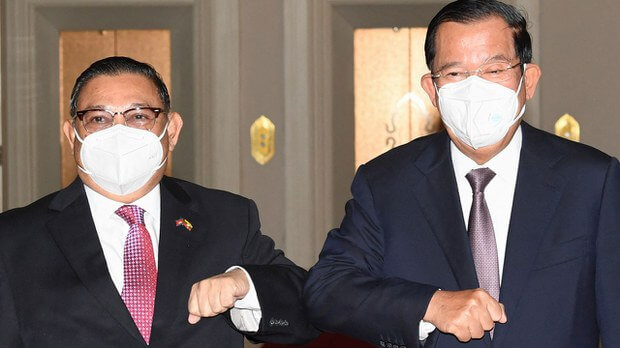Cambodian Prime Minister (PM) Hun Sen, the new chair of the Association of Southeast Asian Nations (ASEAN) met with Myanmar’s military ruler, Min Aung Hlaing, last week. He did not meet Aung San Suu Kyi and made no mention of her in the joint statement he released with Min Aung Hlaing afterwards.
The two-day visit marked the first by a head of government to Myanmar since the junta overthrew the civilian administration in a coup last February. It sparked criticism among several ASEAN members, who criticised the bloc chair for taking unilateral action on the issue they pledged to tackle as a group.
Malaysia
Malaysian Foreign Minister Saifuddin Abdullah condemned the action saying that PM Hun Sen’s visit achieved nothing even after coup leader Min Aung Hlaing pledged to extend a ceasefire with armed ethnic groups.
“We would expect that he could have at least consulted - if not all - a few of his brother leaders [ASEAN] as to what he should say. Not that we are trying to teach him but normally, the ASEAN chairs consult with the others any time (they) want to do something that is considered significant,” Saifuddin told reporters on Thursday evening.
Singapore
During a video call with Hun Sen on Friday, PM Lee Hsien Loong criticised the leader’s meeting with the junta saying that the ASEAN chair needs to engage with all parties of the crisis in Myanmar.
“Prime Minister Lee expressed his view that until there was significant progress in implementing the Five-Point Consensus, ASEAN should maintain its decision reached at the 38th and 39th ASEAN summits of inviting a non-political representative from Myanmar to ASEAN meetings,” said Singapore’s Ministry of Foreign Affairs.
“Any discussion to revise the ASEAN Leaders’ decision had to be based on new facts. Prime Minister Lee emphasised the need for the ASEAN Chair to engage all parties concerned, including the Tatmadaw and the National League for Democracy,” it added.
Philippines
The Philippines’ Foreign Minister Teodoro Locsin said on Sunday that dialogue would be meaningless without Aung San Suu Kyi.
“Aung San Suu Kyi must be there, despite her conviction. The armed forces of Myanmar have nothing to fear, and much to gain, from the democracy it introduced to Myanmar. Suu Kyi is indispensable in a democratic restoration that will pose no threat of anarchy, dissolution and civil conflict,” he said.
At the same time, Manila pledged its support to Phenom Penh in resolving the political and humanitarian crisis.
Indonesia
President Joko Widodo held a phone call with the Cambodian leader on Wednesday, during which he stressed the need for progress on the five-point consensus.
Good phonecall with Chair of ASEAN, PM Hun Sen of Cambodia. I extended my support for Cambodia’s Chairmanship of ASEAN 2022.
— Joko Widodo (@jokowi) January 5, 2022
“Should there be no significant progress on the implementation of the 5PCs (five-point consensus), Myanmar should only be presented (at the) non-political level at ASEAN meetings,” he tweeted afterward.
Moreover, the international community also weighed in on the visit. Noeleen Heyzer, the United Nations secretary-general’s special envoy on Myanmar, urged ASEAN on Thursday to engage all sides in the crisis.
“The special envoy advocated for confidence-building measures involving all stakeholders, in addition to ethnic armed organisations,” the statement said following Heyzer’s discussion with Hun Sen.
Hun Sen’s trip was also met with backlash from anti-military government forces within Myanmar. Protests took place in various parts of the country ahead of Hun Sen’s arrival. According to the Assistance Association for Political Prisoners, which has been monitoring the situation, nearly 1,500 people have been killed since the coup and nearly 11,500 arrested since February 1.
In light of the escalating violence, ASEAN held a virtual summit without any representation from Myanmar last October. The regional grouping had denied entry to political representatives from the country on the basis of the junta’s “insufficient progress” in abiding by the five-point peace roadmap set forth for it last April.
Despite the ASEAN’s united stance on the matter, Hun Sen had offered his support for Myanmar’s participation at ASEAN meetings. “It’s a family member of ASEAN, they must have the rights to attend meetings,” he had said in December.
Over the years, Hun Sen has also faced criticism from rights groups and Western governments over his suppression of democracy. Past reports have claimed that the Cambodian government has severely restricted rights and freedoms and crushed opposition.
Meanwhile, Myanmar’s military government has piled on five additional charges of corruption, each carrying a maximum of 15 years in prison, on ousted civilian leaders Aung San Suu Kyi and President Win Myint. The cases centre on the hiring of a helicopter while Suu Kyi was in office. The ousted leader currently faces nearly a dozen cases that carry a combined maximum sentence of more than 100 years in prison.

